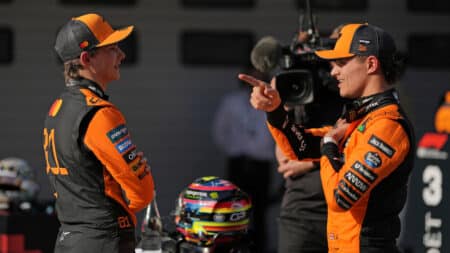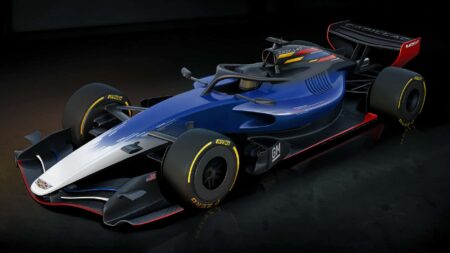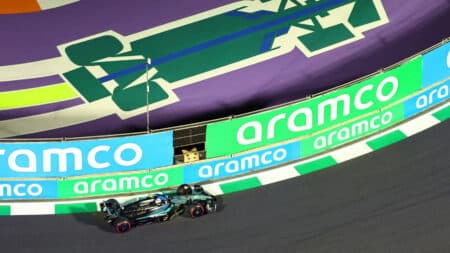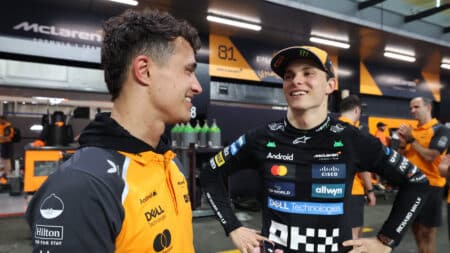
Norris must deal with Piastri's pace – or suffer Mark Webber's fate
As Oscar Piastri moved into the championship lead, his manager Mark Webber's example should serve as a warning to Lando Norris, says Mark Hughes
A long-forgotten, but much treasured, Grand Prix car will make its first run in anger for more than 35 years at the Goodwood Festival of Speed at the end of this month. To understand the significance of this we must reel back the years to 1976.
Beside a railway line, behind a refrigerator factory in Bognor Regis, there was an old chicken shed. In this shed they built a Grand Prix car, borrowing fridge door machinery to make the bodywork when the day shift had gone home. During the day the shed reverberated to the familiar sounds of a V8 Cosworth on a dynamometer bolted to the floor.
Designed by Mike Pilbeam, this was the LEC CRP1, to be driven by British Formula 5000 champion David Purley whose father Charlie had made a fortune from fridges. He and his brother Frank had a fish shop, doing home deliveries by bicycle, the fish packed in ice. But ice was very expensive so, with partner Leslie Jull, the brothers bought the Longford Road Engineering Company and their first refrigerator appeared in 1946.

1976 Shellsport International Series
Formula 5000
Chevron B30
Six wins
– Mallory Park, March 21
– Thruxton, May 31
– Brands Hatch Indy, June 20
– Mallory Park, June 27
– Brands Hatch, August 30
– Brands Hatch Indy, November 7
188 points
Four poles
Series champion
Now, in the winter of 1976 they were making a Grand Prix car, to be entered by LEC Refrigeration Racing. Charles Reginald Purley saw no reason why he could not compete with the very best – “after all, Mario has the same engine in his Lotus,” he was fond of telling people.
So, led by Mike Earle whose Church Farm Racing had run Derek Bell and John Watson, and won the F5000 title with D Purley, the little team started work. They had drawings from Pilbeam, an engine from Cosworth, and a determination to show the big guns what they could do.
“When we first tested the car at Goodwood.” Earle tells me, “David stopped after 50 yards and said ‘it’s broken in half, it’s dragging along the ground’. I explained it was the plastic skirts, allowable under the new rules. He was never very interested in the technical side of things…”
The car’s first outing came at the non-championship Race of Champions at Brands in March. Purley qualified 13th and finished an encouraging 6th ahead of some of the more ‘senior’ teams. Skipping the flyaway races at the start of the season, they went to the Spanish Grand Prix at Jarama in May. The aforementioned Andretti won while the LEC was one of six cars that failed to qualify.

Back home in Bognor they decided to miss the next race at Monaco and return to the fray at Zolder in early June. This time Purley qualified a respectable 20th in a field of no less than 32 cars and what happened on the Sunday is part of racing folklore.
It was raining at the start, and almost everyone was on wets. “We kept him out in the rain,” remembers Mike Earle, “so while the others came in for dries he took the lead. We thought ‘OK, this Formula 1 is easy,’ but then along comes Lauda on new tyres and David held him up as long as he could. With only three of us in the pits we realised we couldn’t do a proper tyre stop… and when he did come in it took about half an hour to change the damn things.”
After the race Purley asked, “who was the guy in the red helmet in the red car, he was like a rat up my chuff?” He soon found out. Back in the paddock he and Herr Lauda had something of a feisty verbal spat, the LEC driver making reference to the Austrian’s ears. Lauda wisely stopped short of exchanging blows with former paratrooper Purley.

Then it all went very wrong at Silverstone in July. The Cosworth’s throttle stuck wide open, Purley slammed into the railway sleepers at Becketts and spent the rest of the season recovering from horrendous leg injuries. The strength of Pilbeam’s chassis had saved his life, but the car would never race again, and is now in the Donington museum as a reminder of a miraculous escape.
By this time the team had nearly completed a spare car, CRP1/02, and Charlie Purley wanted it ready for when his son was fit enough to race again. “Give him something to aim for, won’t it?” Charlie told the team. Years later the family lent the car to the Donington Museum before reluctantly selling it on to new owners Gary Wright and Charlie Birkett. Restoration and preparation experts WDK (Wife Doesn’t Know) Motorsport have spent the last two-and-a-half years restoring the car and Wright/Birkett will shake it down on an airfield this week. Historic racer Joe Twyman will be in the cockpit to compete on the tricky Goodwood hillclimb.

“It would be nice to see the old girl run again,” says Mike Earle, “ there were only eight of us in the team back then and I know mechanic Martin Dixon, and David’s widow Gail, will be there, as will David’s many fans. He was an extraordinary man, great fun, very quick on his day and very brave. They were good times, we had a lot of laughs.”
Those of us who spent time with the team will certainly be there to remember one of racing’s true characters. Sadly, David’s lust for life on the edge finally defeated him when he crashed his Pitts Special while enjoying some aerobatics over Bognor beach in the summer of 1985. Gone, but never forgotten, like the Grand Prix car they built in the chicken shed.

As Oscar Piastri moved into the championship lead, his manager Mark Webber's example should serve as a warning to Lando Norris, says Mark Hughes

General Motors has pushed back its F1 entry as an engine supplier to 2029, but what does it mean?

As Mercedes dropped down the F1 order in Saudi Arabia, team boss Toto Wolff found a hope in Kimi Antonelli's performance for the team

Zak Brown is still adamant on his approach that Lando Norris and Oscar Piastri are ‘number ones’ at McLaren. But how long will it be before history repeats itself and takes a sour turn?